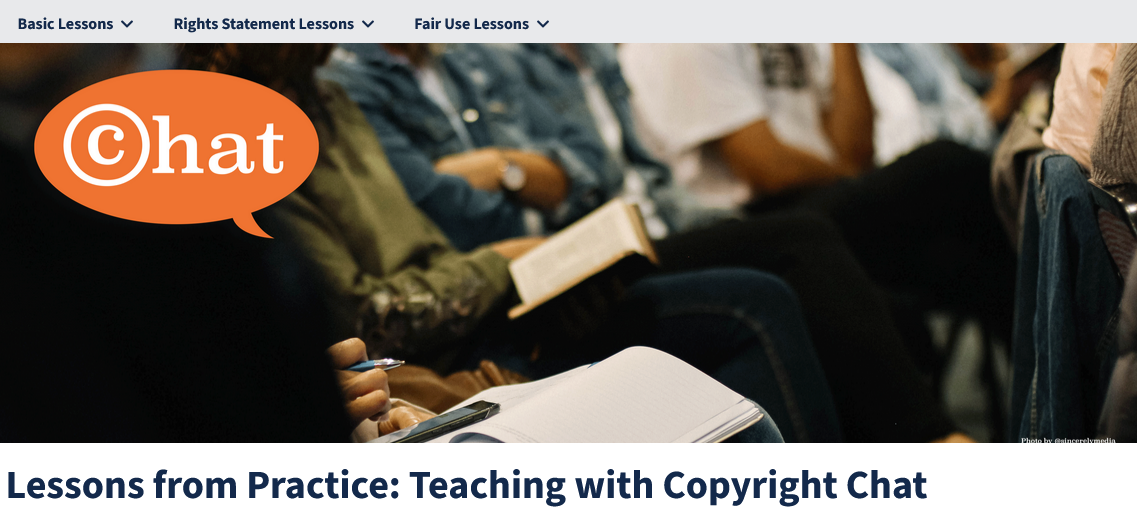This is the latest post in a series announcing resources created for the Scholarly Communication Notebook, or SCN. The SCN is a hub of open teaching and learning content on scholcomm topics that is both a complement to an open book-level introduction to scholarly communication librarianship and a disciplinary and course community for inclusively sharing models and practices. IMLS funded the SCN in 2019, permitting us to pay creators for their labor while building a solid initial collection. These works are the result of one of three calls for proposals (our first CFP was issued in fall 2020; the second in late spring ‘21, and the third in late fall 2021).
Today we’re excited to share “Lessons from Practice: Teaching with Copyright Chat” (available in the SCN OER Commons Hub as well as its own project site), contributed by Sara Benson, who is also curating the SCN Copyright Collection. Sara has been hosting the Copyright Chat podcast since 2017, in which she interviews experts about issues in copyright. These recordings are rich with pedagogic potential, which Sara has developed for us. Here she is to introduce Teaching with Copyright Chat:
I started the podcast titled Copyright Chat to engage with the broader public (outside of my home institution in Illinois) including librarians, students and professors of information science, and the general public about copyright issues relevant to libraries. I work at a land grant institution and part of our mission is to bring our educational efforts to the rest of the state, the country, and, ultimately, the world. In my daily work as a Copyright Librarian, I quickly became aware that copyright is an area of the law that is not well understood–mostly because it is not discussed with enough frequency to become common knowledge with members of the campus community. The most exciting part of hosting Copyright Chat is that I get to learn new things about copyright law by talking to different copyright experts and professionals, too. Copyright law is an exciting area of the law because it changes often through new case-law and legislative and administrative developments–so the podcast is an ever-evolving project.
The podcast archives some evergreen topics such as discussions about author’s rights, copyright myths, and fair use. Although copyright law never gets dull because new cases and laws continue to arise, there are some topics that are key to being a successful information professional. For that reason, select episodes of the podcast were chosen to provide educational context for students studying information science to learn about copyright issues.

These modules are meant to be very flexible so that instructors can use them in their courses as they see fit. They are organized into three categories: Basics Lessons, Fair Use Lessons, and Rights Statements Lessons. Each module explains the lesson objectives and is centered on an episode of the ©hat (Copyright Chat) Podcast. Some modules incorporate recommended readings as well. Each module has some “homework” for students to do outside of class as well as in-class exercises and discussion topics. The lessons are organized into modules because an instructor may only wish to engage with a particular topic, such as fair use or copyright myths, or might be more ambitious and have time to devote to all eight lessons. In any event, each module can stand alone or be used with other modules to create a course unit. The CC-BY license attached to the modules sets the sky as the limit in terms of remixing, reusing, and revising modules and I hope instructors will make these lessons their own. I’m excited to see how these modules will help students learn more about copyright.
About the Author
Sara R. Benson is the copyright librarian and an assistant professor at the Library at the University of Illinois at Urbana-Champaign. She also teaches courses at the iSchool at the University of Illinois. She holds a JD from the University of Houston Law Center, an LLM from Boalt Hall School of Law at Berkeley, and an MSLIS from the School of Information Science at the University of Illinois. Prior to joining the library, Sara was a lecturer at the University of Illinois College of Law for ten years. Sara is the host of the ©hat (“Copyright Chat”) Podcast, available on iTunes.
